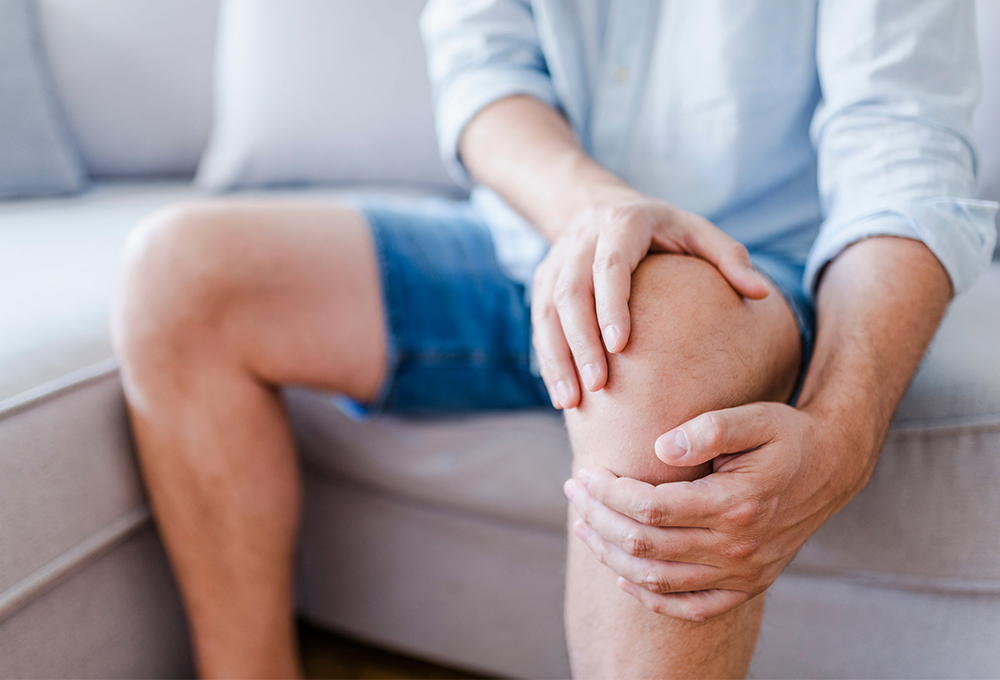Pain in any part of the body can make daily life a challenge. This even more so with pain in the knees. If you are a loved one suffers from knee pain, it’s important to take charge of your situation and get the medical help you need. Don’t ignore pain even if it’s only a dull or mild feeling. Visit an established medical center that specializes in diagnosis and treatment of joint/knee pain. Today, the most common condition associated with joint pain is knee pain its related issues. According to various surveys, about 21.1% of adults are affected by knee pain. In fact the possibility of knee pain cropping up, is more common after the after the late 30s and 40s. When basic movements like walking, sitting and standing becomes affected by knee pain, everyday life is severely impacted. Here are a few steps you can take to begin your process of recovery.
Identifying the cause of your knee pain
As a first step, you should consult a physician about your symptoms. In most cases a physical examination, x-rays, and specific lab tests will be recommended to determine the cause of your knee pain. You may then be referred to consult a specialist in the suspected area so an appropriate diagnosis and treatment method is prescribed.
Knee pain can be caused by one or more underlying problems. Here are a few possible reasons, although only a registered medical practitioner can tell you exactly what is causing your knee pain.
- Osteoarthritis
A common cause of knee pain is Osteoarthritis. According to the CDC, osteoarthritis affects about 32.5 million US adults. It is characterized by pain, stiffness, lack of flexibility and even swelling. The condition develops owing to the breakdown of joint cartilage between the bones.
- ACL Injury
Athletes are most prone to ACL injury, especially those who play football and basketball. This occurs when a ligament called the anterior cruciate ligament is damaged due to excessive strain on the anterior cruciate ligament.
- Rheumatoid Arthritis
Arthritis is an autoimmune disorder that makes the functioning of joints difficult. It is characterized by inflammation and pain in the knees or other joints. It is a chronic disease that affects patients at regular intervals. If RA is suspected you will be referred to a rheumatologist.
- Pseudogout
It happens when some amount of Calcium piles up in joints and commonly affects the knee joints.
These are not the only causes of knee pain, other possible causes include obesity, age, genetic predisposition, accidental injury etc.
Possible treatments for knee pain
Treatments are based on the diagnosis that your physician has made. In addition to specific prescription medicines you may also be prescribed:
- Pain killers
Anti-inflammatory agents have the ability to lower inflammation and thus reduce pain in the knees. If there is severe and chronic pain, small doses of narcotic prescription medications could be prescribed. Narcotics can lead to problems at later stages and so should be avoided as much as possible.
- Physiotherapy
An experienced physiotherapist can help you to recover from knee pain. A specialized therapy routine can be recommended based on the cause and severity of the knee pain. Physiotherapy is effective particularly for recovery from injury of the knee, taping of the kneecap etc.
- Injections and surgeries
Injections and surgeries are often recommended for severe knee pain. The recommendation typically depends upon the underlying cause of knee pain.
What is knee injection therapy?
Knee injection therapy is the process of directly injecting medication to the joints such as the knees for better relief. Patients with Osteoarthritis, Scoliosis, Herniated and degenerative discs are most commonly advised to take Knee injection therapy to relieve pain and other symptoms.
What happen when you undergo Knee injection therapy
- First, the physician administer a local anesthetic treatment to the patient.
- The physician may need to draw out the extra fluid in your knee using a needle.
- Finally a pain-relieving injection is administered which can last for a few weeks to even a few months.
The whole process only takes a few minutes and does not require staying over at the healthcare facility for more than an hour.
Types of Knee Injection Therapy
- Corticosteroids Injection
Corticosteroids Injection is acceptable when there is excessive fluid build-up in the knee or if the knee pain is due to Osteoarthritis. Corticosteroids help reduce the inflammation in the joint and thereby relieves the symptoms. It works quickly and is short-term. Frequency of these injections are as prescribed by an experienced medical specialist in the area of joint injections.
- Hyaluronic Injection
Gel injection or Hyaluronic Injection is the process of injecting hyaluronic acid directly to the knee to increase fluidity or restore a normal range of motion in the joints. It is a lubricant that allows the smooth movement of bones between joints, thus reducing the pain.
At All Star Health, we know that the cost of pain-free living may be high for many. That’s why our facility is manned with top specialists offering expert evaluation and pain management therapies such as knee injection therapy at an affordable cost, smooth processes and at convenient and wait-free locations. We want to see you heal and get back to living a normal life as soon as possible.
Call or drop us a note to make an appointment today!



